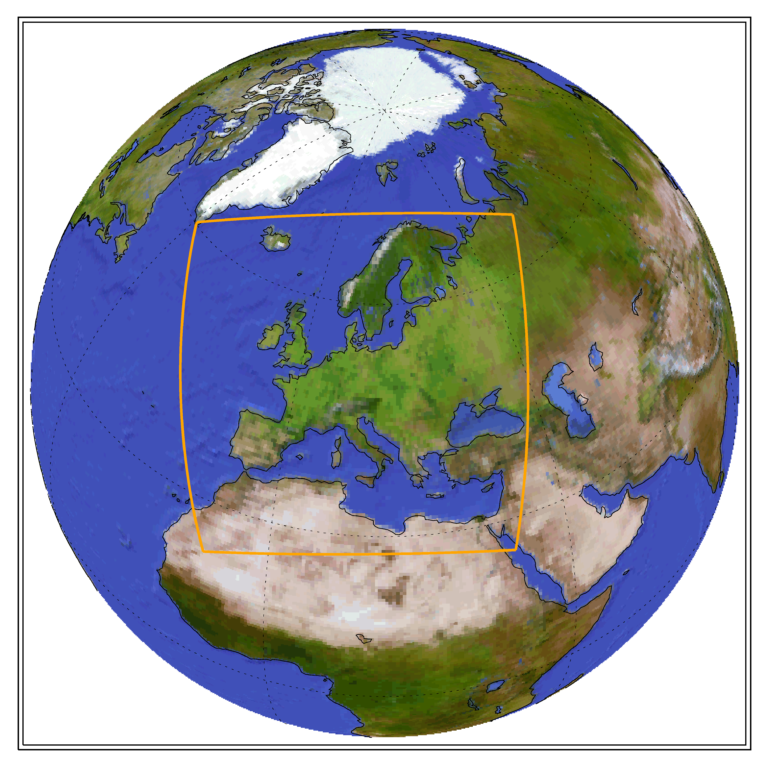

11-15 December 2023
Progress on the evaluation of the simulations was presented during the 'American Geophysical Union 2023 Fall Meeting' in San Francisco, USA.
16-20 October 2023
At the 'XII European Congress of Entomology - ECE2023' in Heraklion, Crete, Greece, Dr James Ciarlo` presented the method developed for PALEOSIM to assess the ideal climatological conditions of an arthropod's habitat according to the observed locations of a species of interest.
4 September-15 October 2023
During a 6 week secondment at the Abdus Salam International Centre for Theoretical Physics, in Trieste, Italy, Dr Ciarlo` collaborated with the Earth System Physics Section for the preparations of the paleoclimate simulations. The RegCM requires adjustments to several input conditions in order to run reliable simulations. Special attenton was given to orbital parameters, greenhouse gas concentrations, terrain types, and elevation (the elevation map for the Last Glacial Maximum is shown below).

While in Trieste, PALEOSIM was also featured in a poster for the 'International Conference on Regional Climate ICRC-CORDEX 2023', and the paleoclimate tool and requirements of RegCM were presented at the '11th Workshop on the Theory and Use of Regional Climate Models'.
22-26 April 2023 [Newspoint]
The first fieldwork conducted outside of Malta took place at the end of April, in Sicily and Lampedusa. Following a public talk at the University of Catania (see Outreach), Dr Ciarlo` was accompanied by Prof. David Mifsud, and Arthur Lamoliere on this observation campaign into the Circum-Sicilian islands. This was the first of several fieldwork activities that will take place on several islands in the region to observe and log (using the citizen-science app) arthropods in their natural habitat.
The images below describe some of the species observed on this trip. From left to right, the top images show Liometopum microcephalum (Small-headed Tree Ant) and Scarabaeus variolosus (Old World Dung Beetle) from Sicily, while the bottom images show Polyommatus celina (Austaut's Blue [butterfly]) and Apis mellifera (Western Honey Bee) from Lampedusa.

13 March 2023
The paper describing the Regional Climate Model, RegCM5 and initial testing on the European region is published on the "Journal of Geophysical Research: Atmospheres" with Dr James Ciarlo` as a co-author. The RegCM5 will be used to run the new simulations required for the PALEOSIM project. The paper may be cited as follows:
, , , , , , et al. (2023). The fifth generation regional climate modeling system, RegCM5. Part I: Description and illustrative examples at parameterized convection and convection-permitting resolutions. Journal of Geophysical Research: Atmospheres, 128, e2022JD038199. https://doi.org/10.1029/2022JD038199
15 January-16 March 2023
Dr James Ciarlo` spent 2 months on secondment at the Abdus Salam International Centre for Theoretical Physics, in Trieste, Italy. He collaborated with the Earth System Physics Section on new tests and analysis for the Regional Climate Model, RegCM5. This also provided crucial support to identify the most stable study domain for the PALEOSIM project. While configuration tests are still ongoing, PALEOSIM simulations will focus on the region shown below, which describes an area of 1800x3180 km as a box of 600x1060 grid cells (each of 3x3 km).


30 January-3 February 2023
The Marie Curie European Research Officer, Dr James Ciarlo` participated in the EURO-CORDEX General Assembly (held online), where the future plans of the EURO-CORDEX simulations were discussed. CORDEX is an initiative to advance and coordinate the science and application of regional climate modelling through global partnerships. The EURO-CORDEX domain describes an area of 4980x5124 km as a box of 415x427 grid cells (each of 12x12 km) as shown below.
27 September 2022
PALEOSIM Project is live on ResearchGate, where updates and milestones will be added regularly.
Note: As of 31st March 2023, ResearchGate will retire the Projects feature and remove all projects from the site. New PALEOSIM updates will be shared on the project's Facebook page.
1 September 2022
Website Launch. Information about the project and the research team is made available. A section has been dedicated to the Citizen Science Program which will be launched within the coming weeks. Further information about the project and activities will be made available throughout the duration of the project.
1 August 2022
Project kick-off at the University of Malta (host institution).